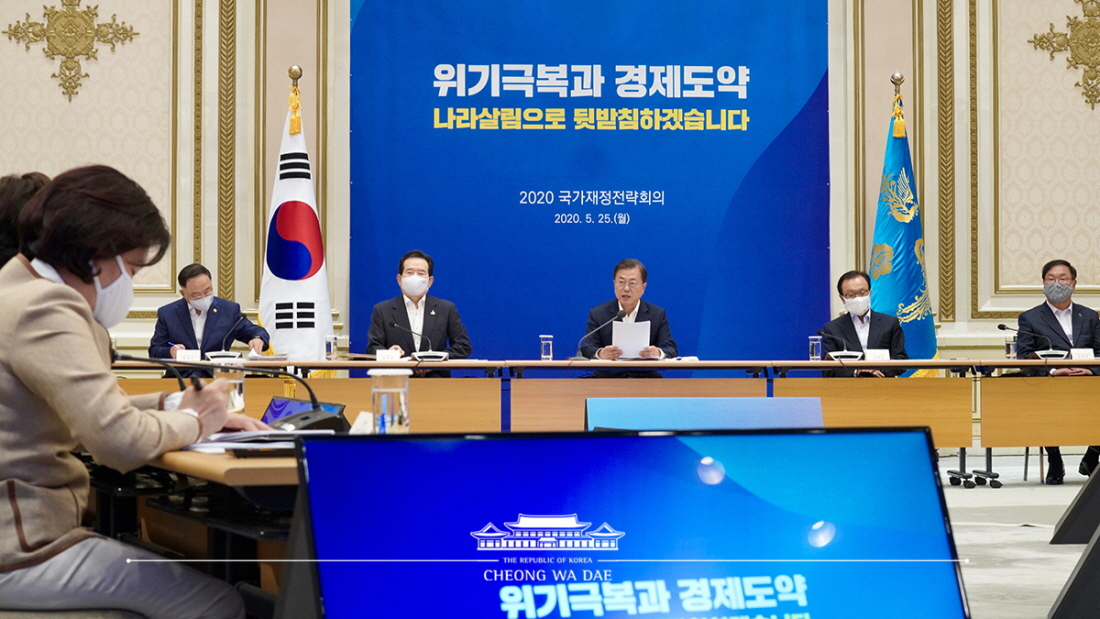이 웹사이트는 제19대 대통령 임기 종료에 따라 대통령기록관이 「대통령기록물 관리에 관한 법률」에 의해 이관받아 서비스하는 대통령기록물입니다. 자료의 열람만 가능하며 수정 · 추가 · 삭제는 불가능합니다.
다만, 「개인정보보호법」에 의하여 개인의 정보를 보호받기 원하시는 분은 관련 내용(요청자, 요청내용, 연락처, 글위치)을 대통령 웹기록물 담당자(044-211-2253)에게 요청해 주시면 신속히 검토하여 조치해 드리겠습니다. 감사합니다.
SPEECHES & REMARKS
BRIEFINGS

This year’s annual National Fiscal Strategy Meeting has been convened amid a global economic crisis. Many representatives from the National Assembly are also joining us today, including Chairman Lee Hae-chan, Floor Leader Kim Tae-nyeon and Policy Committee Chairperson Cho Jeong-sik from the Democratic Party of Korea. Fiscal operation strategies, too, are bound to be subject to a sea change in accordance with economic circumstances. I hope everyone engages in discussions with grave awareness and extraordinary determination.
Fiscal spending is a direct means to realize government policies. It should reflect our society’s desired direction and goals and also play a leading role in addressing the suffering of the people during an economic crisis. “For whom and toward what should fiscal spending be?” is a question that is more imperative now than ever.
We cannot see the bottom of the world economy. The International Monetary Fund forecasts that the cumulative loss to global GDP over this year and next year could be greater than the economies of Japan and Germany combined. Due to the worst recession since the Great Depression and negative growth, income per capita is projected to shrink for over 170 countries around the world.
Our economy is no exception. Amidst plunging exports, contractions in the airline, tourism, dining and other service industries are expanding into a manufacturing industry crisis. Employment numbers have sharply decreased, making the employment shock more visible as well. This is undeniably an economic wartime situation. The Government should mobilize all available fiscal capabilities with the resolve to draw up a fiscal budget as if in wartime. When extinguishing a fire, pouring enough water early on will allow it to be put out quickly, making it possible to prevent greater damage. This is why the IMF is warning that if countries do not undertake bold fiscal measures now, they will end up paying an even higher price in the near future.
To date, our fiscal authorities have prioritized fiscal soundness and built up fiscal space for an expansionary policy, which provides significant help now. Almost every country in the world is already fully mobilizing its finances. The total amount of fiscal support already announced amounts to US$9 trillion – 10 percent of the world’s GDP. Through five rounds of Emergency Economic Council meetings, we also made the extraordinary decision to allocate a total of 250 trillion won for small and mid-size microbusiness owners, vulnerable workers, affected businesses and key industries. That’s equivalent to 13 percent of our GDP.
Fiscal spending played an immense role when people started to experience difficulties with day-to-day living. However, bolder fiscal moves are required now as the contraction in the real economy, including employment and exports, has begun in earnest. I urge you to expeditiously prepare a proposal for the third supplementary budget that goes beyond the first and second ones.
The third supplementary budget should incorporate sweeping support to expand the employment and social safety nets, protect both businesses in crisis and people’s jobs and revive economic vitality. Fiscal spending should serve as a breakwater to stem waves of economic shock and as pump-priming to hasten economic recovery.
While striving to overcome the economic crisis, we should also prepare a Korean New Deal to make a fresh leap forward in the post-COVID-19 era. We will build the foundation for sustainable growth through a “Green New Deal” that generates eco-friendly jobs along with a “Digital New Deal” that creates forward-looking jobs while preparing in advance for the transition to a digital economy. Moreover, we will expand welfare systems in response to job changes in the digital economy era and continue to push ahead with reforms for a fair economy.
Fiscal spending must serve as not only treatment for the current economic crisis but also a vaccine that can reinforce post-COVID-19 economic fundamentals and immunity. Since the effectiveness of a supplementary budget depends on its speed and timing, I urge everyone to cooperate so that the National Assembly can pass the third supplementary budget bill in June.
Some have expressed concerns about the deterioration of fiscal soundness. I ask the financial authorities to fully bear that point in mind as well. However, in this severe situation, we have no choice but to quickly overcome the crisis through ample fiscal injection and to recover fiscal soundness by increasing the growth rate, thus leading to a long term virtuous cycle of fiscal investment. This is actually the way to prevent deterioration of the government debt-to-GDP ratio in the long term.
Korea’s fiscal condition is one of the soundest among the OECD member countries. The country’s government debt-to-GDP ratio – after reflecting the second supplementary budget – stands at 41 percent. Even after factoring in the third supplementary budget, the ratio is much lower than the OECD average of almost 110 percent. Moreover, the degree that the debt ratio has increased due to responses to the COVID-19 outbreak is also relatively low compared to those of other major countries. We have to appropriately utilize our fiscal leeway to safeguard the people’s lives while considering fiscal soundness.
Of course, intensive restructuring of expenditures must be carried out at the same time. Nonessential spending should be reduced drastically. Most of all, considering that conditions for tax revenue will not be sufficient next year, excruciating restructuring of spending is essential. The Government will take the lead in belt tightening.
Since the pre- and post-COVID-19 outbreak situations differ so much, I urge each ministry and agency to actively cooperate in the restructuring of expenditures by meticulously examining once more the spending priorities from scratch. I also ask the ruling party to actively express opinions and lead discussions effectively in the National Assembly.
Thank you.



